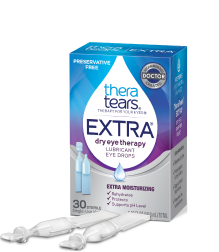Science-Backed Hydration™

The Most Common Reasons Behind Dry Eye Irritation
As you start to learn more about dry eye, you may wonder about the elusive cause behind the condition. The fact is there could be many different reasons why your eyes are dry. Your age, the environment, LASIK eye surgery, and many other factors could be the reason for your discomfort.
If you want to find true dry eye symptom relief, then it’s important to learn the common reasons behind dry eye irritation, so you can better manage your symptoms. We’ve collected a list of the most common causes of dry eyes, so you can start taking preventive actions and discover a dry eye treatment method that works for you.
What is dry eye?
Dry eye occurs when your body cannot produce enough tears to lubricate and moisturize your eyes. Sometimes, your eyes cannot produce a healthy number of tears, and sometimes they cannot produce the right tears to lubricate your eyes.
The tear film is made up of three layers, the oil layer, the aqueous (water) layer, and the mucus layer. All the tear film layers must remain in a happy balance to provide your eyes with the moisture they need. If for some reason one of the layers of the tear film falls out of balance, then it’s likely that you’ll experience dry eye.
What are the most common reasons behind a dry eye condition?
Age
As we get older, our eyes struggle to produce quality tears continuously. It is very common for adults over the age of 50 to experience dry eye symptoms and have more sensitive eyes. The natural aging process leads to our eyes producing fewer natural tears, so our eyes may need some extra help.
Gender
Women are twice as likely to experience dry eyes in comparison to men. This is due to hormonal changes caused by different body cycles. We have hormone receptors in our eyes, like androgen (testosterone) and estrogen. So, menstruation, pregnancy, and menopause can all cause hormonal changes, affecting the eyes’ ability to produce, drain, and evaporate tears.
Environmental Conditions
Did you know that where you live and work could be the reason for your dry eyes? Some environmental conditions can have a negative impact on our eyes and increase tear evaporation. Excessive exposure to smoky, windy, or dry climates can have a negative effect on our eyes. You can’t always change where you live or work, so it’s recommended to take precautions and wear protective eyewear while being outside for a long time.
Overuse of Eyes
We’ve all scrolled social media for hours or spent our days staring at a screen. Any time we use our eyes for long periods of time we forget to blink, which helps spread tears across the surface of our eyes. So, staring at a computer screen, reading, or driving for a long time may be the reason for your dry eyes. Remember to blink and take eye breaks whenever you’re performing an activity that may overwork your eyes.
Medications
Some medications reduce natural tear production, and tears are essential to keeping our eyes moisturized and healthy. Medications like decongestants, blood pressure medications, antidepressants, antihistamines, and diuretics may all list dry eyes as a symptom. It’s also likely that any medication that causes dry mouth also causes dry eyes.
Blepharitis
Blepharitis is a common eye condition resulting from too much bacteria on your eyelids. The extra bacteria could cause your eyelids to get inflamed and may turn them inward or outward. This could mean your eyes may have difficulty holding onto your tears, causing dry eye.
Medical Conditions
Many autoimmune conditions can cause inflammation in the eye glands, preventing your eyes from producing enough tears.
Diabetes is often linked to nerve damage in the cornea. If your cornea’s nerves are damaged or non-functioning, they cannot communicate when your eyes are dry. So, overall, there’s less natural tear production, resulting in a dry eye condition.
Lupus can also cause damage and changes in the nerves and blood vessels in and around the eyes, which could lead to vision problems. About 20% of people with lupus also have Sjögren’s Syndrome, which impacts the body’s ability to produce moisture in the mucous membranes.
Sjögren’s Syndrome
Sjögren’s Syndrome is an autoimmune disorder that can cause tear gland damage. People with Sjögren’s Syndrome experience inflammation within the mouth glands that produce saliva and inflammation in the eye’s mucous membranes. This inflammation causes the membranes to become dry, leading to trouble swallowing, dry mouth, and fewer tears to lubricate the eyes.
LASIK Surgery
During LASIK surgery, a laser changes the shape of the cornea, which may affect or sever some nerve endings. If the cornea’s nerves cannot properly communicate with the eye glands, your eyes may produce fewer tears. Inflammation from LASIK surgery can also be a contributing factor. Thankfully, symptoms should improve within three months after surgery, and lubricating eye drops can provide relief.
There are many different reasons why you may develop a dry eye condition. The important thing to learn about what is causing it and furthermore, how to relieve symptoms so you can potentially avoid a dry eye condition in the future.
EXTRAordinary relief, now available in preservative free vials
TheraTears EXTRA dry eye therapy

EXTRAordinary relief, now available in preservative free vials

